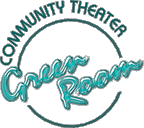|
|
When actors first go off-book or out
of book, that is, rehearse without their scripts, they sometimes
forget their lines and blocking. You are there to help them
when they need some prompting. |
- Talk to the director about what to do if someone gets
confused about their blocking. In general, you don't want
to interrupt the action if someone makes a small mistake.
Often the other actors will straighten them out. If people
start falling over one another, it may be time to speak
up.
|
- Make sure that the actors, the director, and the bookholder
agree on what the actors should say if they have forgotten
a line and need help. In general, actors should stay in
character and simply say, "line." Unacceptable methods
of asking for help include yelling "LINE!!!" at the bookholder;
saying something like, "uh, what was I supposed to say?";
or the ever-popular choice, " what the *@#%&* is my *($@#*
line?". Asking for help also doesn't involve staring at
the bookholder with a closed mouth and an expectant-yet-blank
stare. Just a nice, spoken "line," please.
|
- When you read a line to an actor, speak clearly and
make sure you're loud enough to be heard on stage. Hold
your script up a bit so you aren't reading into your lap.
Keep an ear out for when the actor has picked up his/her
line and is ready to continue on their own -- that's your
cue to stop reading.
|
- Be careful about eating and drinking when holding book.
You don't want to get caught with your mouth full.
|
- Keep your eyes on your script! It is 100% guaranteed
that if you look away from your script for even half a
second, someone will call for a line. Yes, that means
you need to keep your nose in your book at all times.
And that you will have to wait to see what the actors
are doing until the director decides to stop using your
capable services. Plan to come for dress rehearsal if
you want to see what wonders you have helped to create.
|
- Don't try to be a mind reader. Actors need to call for
a line if they want help, it's not up to you to decide.
|
- Make it very clear that you will not respond to silence
in most cases, as some actors need this quiet to help
them remember their lines. The only exception is when
it becomes clear that someone has dropped a line and the
cast is confused as to who needs to be talking. This is
usually pretty easy to spot -- you'll see a stage full
of actors staring at each other with blank expressions.
DO give them some time to fix things themselves, especially
as you get closer to opening -- actors drop lines in performance,
and rehearsal is the place where they can learn to cover
for one another. If it seems hopeless or if someone asks
for help, first say the name of the character who should
be speaking. Often, that's enough to prompt the line.
If the actor has completely forgotten the line, they will
need to call for it at that point.
|
- SPECIAL HINT! To be a bigger help to your actors,
take full advantage of non-verbal cues. When actors are
uncertain about a line, they will often cast a glance
to the bookholder, possibly to see if the psychic connection
is working and the words will suddenly appear in their
head. A gentle nod when an actor is headed in the right
direction can help them know that they are on the right
track and give them the confidence to continue. (Editor's
note: Many directors tell actors not to look at the bookholder
at all when asking for a line, since doing so requires
them to break character)
|
- Some bookholders don't start going to rehearsals until
the cast is off book -- this is a mistake. First, you
won't be familiar with the play, the characters, or the
actors, and this will make your job much harder. Also,
if you're new to community theater, you would miss out
on an exceptional opportunity to learn. Talk to the director
about when you are expected to start showing up for rehearsals
before you agree to take on the task of bookholder.
|
- Some actors go off-book before the rest of the cast.
Talk to your director to make sure what your obligation
is in that case.
Next: Helping
the Actors With Lines
Back to beginning of article
|
|

|
|